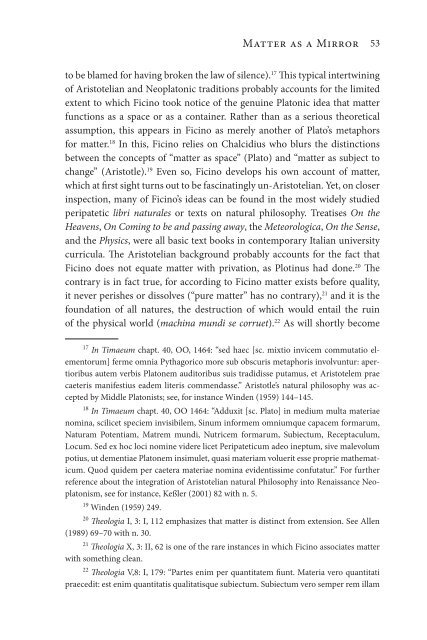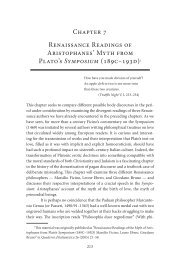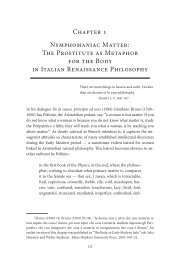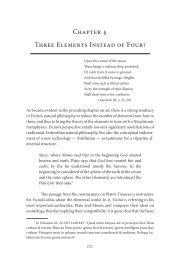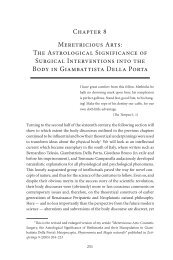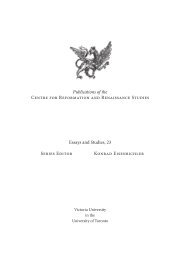Chapter 2 Matter as a Mirror: Marsilio Ficino and Renaissance ...
Chapter 2 Matter as a Mirror: Marsilio Ficino and Renaissance ...
Chapter 2 Matter as a Mirror: Marsilio Ficino and Renaissance ...
You also want an ePaper? Increase the reach of your titles
YUMPU automatically turns print PDFs into web optimized ePapers that Google loves.
<strong>Matter</strong> <strong>as</strong> a <strong>Mirror</strong> 53<br />
to be blamed for having broken the law of silence). 17 This typical intertwining<br />
of Aristotelian <strong>and</strong> Neoplatonic traditions probably accounts for the limited<br />
extent to which <strong>Ficino</strong> took notice of the genuine Platonic idea that matter<br />
functions <strong>as</strong> a space or <strong>as</strong> a container. Rather than <strong>as</strong> a serious theoretical<br />
<strong>as</strong>sumption, this appears in <strong>Ficino</strong> <strong>as</strong> merely another of Plato’s metaphors<br />
for matter. 18 In this, <strong>Ficino</strong> relies on Chalcidius who blurs the distinctions<br />
between the concepts of “matter <strong>as</strong> space” (Plato) <strong>and</strong> “matter <strong>as</strong> subject to<br />
change” (Aristotle). 19 Even so, <strong>Ficino</strong> develops his own account of matter,<br />
which at first sight turns out to be f<strong>as</strong>cinatingly un-Aristotelian. Yet, on closer<br />
inspection, many of <strong>Ficino</strong>’s ide<strong>as</strong> can be found in the most widely studied<br />
peripatetic libri naturales or texts on natural philosophy. Treatises On the<br />
Heavens, On Coming to be <strong>and</strong> p<strong>as</strong>sing away, the Meteorologica, On the Sense,<br />
<strong>and</strong> the Physics, were all b<strong>as</strong>ic text books in contemporary Italian university<br />
curricula. The Aristotelian background probably accounts for the fact that<br />
<strong>Ficino</strong> does not equate matter with privation, <strong>as</strong> Plotinus had done. 20 The<br />
contrary is in fact true, for according to <strong>Ficino</strong> matter exists before quality,<br />
it never perishes or dissolves (“pure matter” h<strong>as</strong> no contrary), 21 <strong>and</strong> it is the<br />
foundation of all natures, the destruction of which would entail the ruin<br />
of the physical world (machina mundi se corruet). 22 As will shortly become<br />
17 In Timaeum chapt. 40, OO, 1464: “sed haec [sc. mixtio invicem commutatio elementorum]<br />
ferme omnia Pythagorico more sub obscuris metaphoris involvuntur: apertioribus<br />
autem verbis Platonem auditoribus suis tradidisse putamus, et Aristotelem prae<br />
caeteris manifestius eadem literis commend<strong>as</strong>se.” Aristotle’s natural philosophy w<strong>as</strong> accepted<br />
by Middle Platonists; see, for instance Winden (1959) 144–145.<br />
18 In Timaeum chapt. 40, OO 1464: “Adduxit [sc. Plato] in medium multa materiae<br />
nomina, scilicet speciem invisibilem, Sinum informem omniumque capacem formarum,<br />
Naturam Potentiam, Matrem mundi, Nutricem formarum, Subiectum, Receptaculum,<br />
Locum. Sed ex hoc loci nomine videre licet Peripateticum adeo ineptum, sive malevolum<br />
potius, ut dementiae Platonem insimulet, qu<strong>as</strong>i materiam voluerit esse proprie mathematicum.<br />
Quod quidem per caetera materiae nomina evidentissime confutatur.” For further<br />
reference about the integration of Aristotelian natural Philosophy into <strong>Renaissance</strong> Neoplatonism,<br />
see for instance, Keßler (2001) 82 with n. 5.<br />
19 Winden (1959) 249.<br />
20 Theologia I, 3: I, 112 emph<strong>as</strong>izes that matter is distinct from extension. See Allen<br />
(1989) 69–70 with n. 30.<br />
21 Theologia X, 3: II, 62 is one of the rare instances in which <strong>Ficino</strong> <strong>as</strong>sociates matter<br />
with something clean.<br />
22 Theologia V,8: I, 179: “Partes enim per quantitatem fiunt. Materia vero quantitati<br />
praecedit: est enim quantitatis qualitatisque subiectum. Subiectum vero semper rem illam


